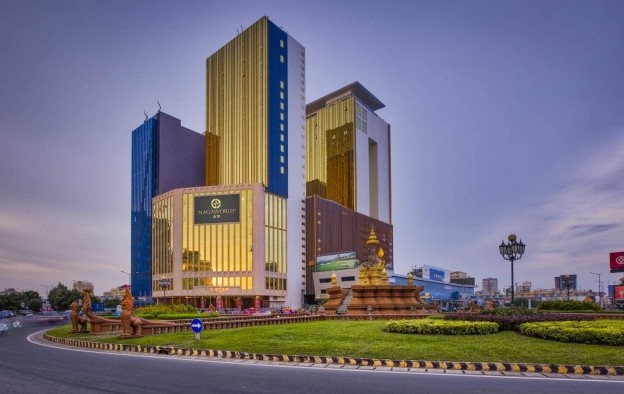NagaCorp insulated from China proxy bet row: analysts
Oct 03, 2019 Newsdesk Latest News, Rest of Asia, Top of the deck

The Phnom Penh casino market in Cambodia, monopolised by Hong Kong-listed NagaCorp Ltd, is the “most insulated” from “the volatility associated with China”, suggested a Wednesday note from brokerage Union Gaming Securities Asia Ltd.
Such insulation was “driven in part by the close relationship” between China and Cambodia, stated the brokerage.
The “volatility associated with China” was a reference, said the institution, to a “proxy betting/online crackdown” said to have been aimed by the Chinese authorities at gaming operations across the Asia-Pacific region catering for Chinese players, and which had led to a “decline” in business at some other “bricks-and-mortar” casinos in the region, as Union Gaming put it.
Earlier this week NagaCorp said it had recorded net gaming revenue of US$616.3 million for the nine months ended September 30, up by 28.5 percent in year-on-year terms. The company said its mass-market table buy-ins rose by 37.9 percent to US$1.22 billion during the period, while the bills-in tally for its electronic gaming machines rose by 27.9 percent to US$2.05 billion.
Noting that – according to NagaCorp – in the third quarter to September 30, the casino firm had recorded mass-market table volume up 49 percent year-on-year, Union Gaming stated: “… there exists significant growth in the broader Phnom Penh economy (driven in part by continued Chinese investment), along with Naga2 viewed as an attractive destination for customer segments that previously would have eschewed a trip to Cambodia.”
Union Gaming analysts Grant Govertsen and John DeCree said in their brokerage’s Wednesday memo: “… we view the high-margin mass table business [at NagaCorp] as having the most visibility given the close relationship between China and Cambodia (this also gives some comfort with respect to continued VIP out-performance relative to regional peers).”
Proxy betting – whereby a gambler not physically present in a casino can communicate via a phone or Internet connection to ask a person who is, i.e. a “proxy”, to place a bet on their behalf – has been subject to a de facto ban in the Macau market since May 2016. But state-controlled media recently alleged that one of Macau’s leading junket brands, Suncity Group, had been facilitating “online” play in regional casinos outside Macau, understood to be a reference to proxy betting. The junket brand denied such activity.
A senior NagaCorp executive said at a company event in Hong Kong in July that the firm did not have “any material exposure” to proxy betting in its Cambodia operations.
The Macau government recently said it was tightening the rules on the sharing of Macau player and other Macau gaming-related data with entities outside Macau.
In September CGS-CIMB Research Pte Ltd said it expected NagaCorp to achieve 30-percent growth in VIP revenue this year in its Cambodia operation, compared to likely “mid-teen” percentage decline in the Macau market.
NagaCorp opened a US$369 million extension to NagaWorld – known as Naga 2 (pictured) – in November 2017. In August this year, an extraordinary general meeting of the group’s shareholders voted in favour of a financing plan for a further phase, known as Naga 3. A capital spend of up to US$4 billion has been mentioned for that.
Union Gaming’s Mr Govertsen and Md DeCree said in their Wednesday memo: “Based on current trends, we believe Naga should generate enough free cash flow to support the current approximately 60-percent dividend payout ratio and also fund its share of Naga3 development costs.”
In July, NagaCorp reported net profit of about US$245.1 million for the first six months of the year, a 36.1-percent increase over the corresponding period last year.
Related articles
-
 Donaco EBITDA up y-o-y to above US$4mln...
Donaco EBITDA up y-o-y to above US$4mln...Jul 26, 2024
-
 Cambodia PM imposes ban on new casinos...
Cambodia PM imposes ban on new casinos...Jul 24, 2024
More news
-
 HK listed Palasino upgrades Czech...
HK listed Palasino upgrades Czech...Jul 26, 2024
-
 China embassy in Manila welcomes POGO...
China embassy in Manila welcomes POGO...Jul 26, 2024
Latest News
Jul 26, 2024
Border-casino operator Donaco International Ltd has achieved a 164.17-percent year-on-year increase in its latest quarterly group earnings before interest, taxation, depreciation and amortisation...Sign up to our FREE Newsletter
 (Click here for more)
(Click here for more)
Pick of the Day
”We’ve got more traction outside of Macau at the moment. But Macau’s going be a bigger focus for us”
David Punter
Regional representative at Konami Australia
Most Popular
 Sheraton brand to exit Londoner Macao, to be Londoner Grand July 25, 2024
Sheraton brand to exit Londoner Macao, to be Londoner Grand July 25, 2024  Macau regulator probes unlicensed gaming agents July 24, 2024
Macau regulator probes unlicensed gaming agents July 24, 2024  Philippines gives 20k aliens in POGOs 60 days to leave July 25, 2024
Philippines gives 20k aliens in POGOs 60 days to leave July 25, 2024  Philippines-listed DigiPlus says not affected by POGO ban July 24, 2024
Philippines-listed DigiPlus says not affected by POGO ban July 24, 2024  Sands China 2Q EBITDA down q-o-q amid low hold, renovation July 25, 2024
Sands China 2Q EBITDA down q-o-q amid low hold, renovation July 25, 2024





